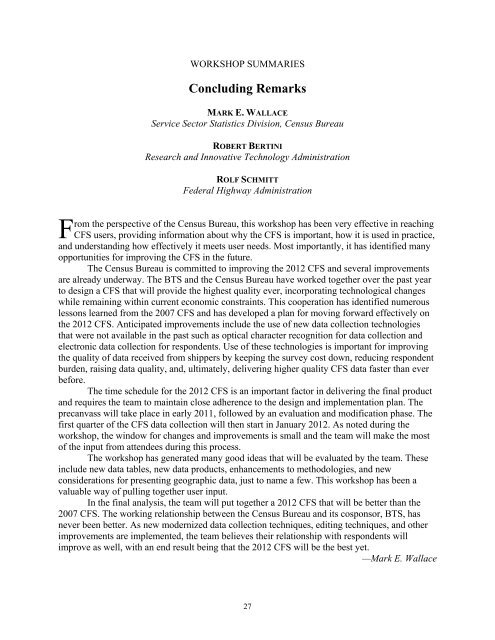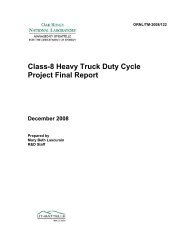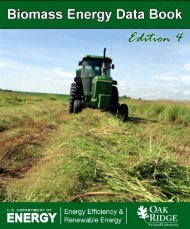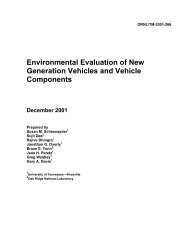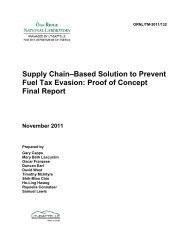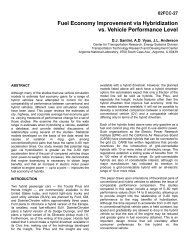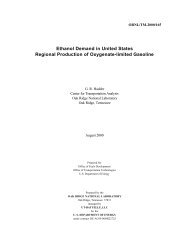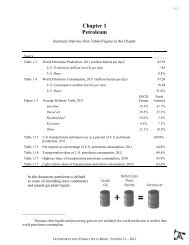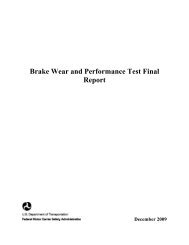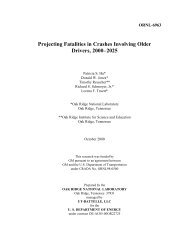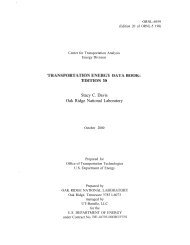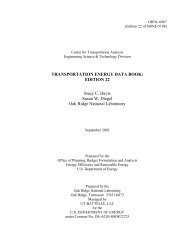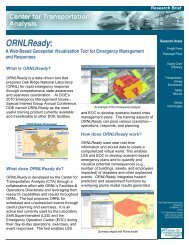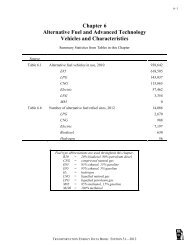E-C158 Cover1 - Center for Transportation Analysis - Oak Ridge ...
E-C158 Cover1 - Center for Transportation Analysis - Oak Ridge ...
E-C158 Cover1 - Center for Transportation Analysis - Oak Ridge ...
Create successful ePaper yourself
Turn your PDF publications into a flip-book with our unique Google optimized e-Paper software.
F<br />
WORKSHOP SUMMARIES<br />
Concluding Remarks<br />
MARK E. WALLACE<br />
Service Sector Statistics Division, Census Bureau<br />
ROBERT BERTINI<br />
Research and Innovative Technology Administration<br />
ROLF SCHMITT<br />
Federal Highway Administration<br />
rom the perspective of the Census Bureau, this workshop has been very effective in reaching<br />
CFS users, providing in<strong>for</strong>mation about why the CFS is important, how it is used in practice,<br />
and understanding how effectively it meets user needs. Most importantly, it has identified many<br />
opportunities <strong>for</strong> improving the CFS in the future.<br />
The Census Bureau is committed to improving the 2012 CFS and several improvements<br />
are already underway. The BTS and the Census Bureau have worked together over the past year<br />
to design a CFS that will provide the highest quality ever, incorporating technological changes<br />
while remaining within current economic constraints. This cooperation has identified numerous<br />
lessons learned from the 2007 CFS and has developed a plan <strong>for</strong> moving <strong>for</strong>ward effectively on<br />
the 2012 CFS. Anticipated improvements include the use of new data collection technologies<br />
that were not available in the past such as optical character recognition <strong>for</strong> data collection and<br />
electronic data collection <strong>for</strong> respondents. Use of these technologies is important <strong>for</strong> improving<br />
the quality of data received from shippers by keeping the survey cost down, reducing respondent<br />
burden, raising data quality, and, ultimately, delivering higher quality CFS data faster than ever<br />
be<strong>for</strong>e.<br />
The time schedule <strong>for</strong> the 2012 CFS is an important factor in delivering the final product<br />
and requires the team to maintain close adherence to the design and implementation plan. The<br />
precanvass will take place in early 2011, followed by an evaluation and modification phase. The<br />
first quarter of the CFS data collection will then start in January 2012. As noted during the<br />
workshop, the window <strong>for</strong> changes and improvements is small and the team will make the most<br />
of the input from attendees during this process.<br />
The workshop has generated many good ideas that will be evaluated by the team. These<br />
include new data tables, new data products, enhancements to methodologies, and new<br />
considerations <strong>for</strong> presenting geographic data, just to name a few. This workshop has been a<br />
valuable way of pulling together user input.<br />
In the final analysis, the team will put together a 2012 CFS that will be better than the<br />
2007 CFS. The working relationship between the Census Bureau and its cosponsor, BTS, has<br />
never been better. As new modernized data collection techniques, editing techniques, and other<br />
improvements are implemented, the team believes their relationship with respondents will<br />
improve as well, with an end result being that the 2012 CFS will be the best yet.<br />
—Mark E. Wallace<br />
27


